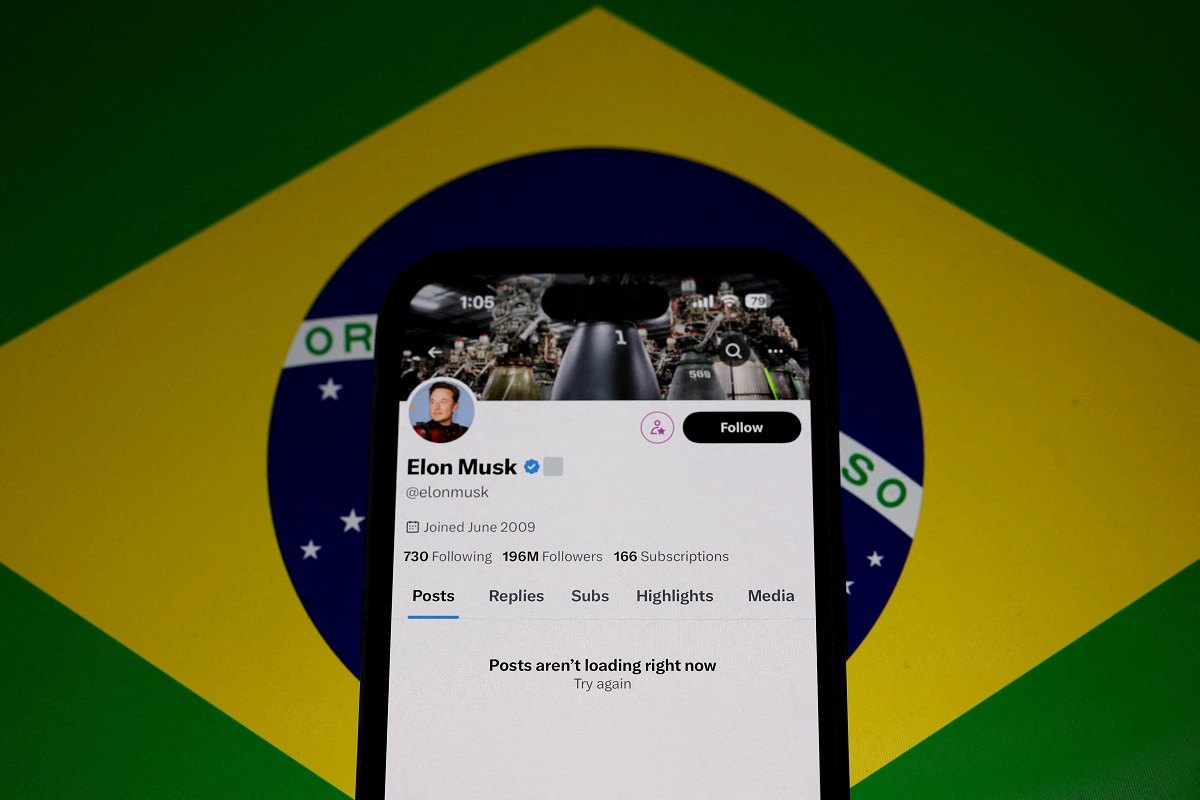
The X account of Elon Musk in seen blocked on a mobile screen in this illustration after Brazil’s telecommunications regulator suspended access to Elon Musk’s X social network in the country to comply with an order from a judge who has been locked in a months-long feud with the billionaire investor, Sao Paulo, Brazil taken August 31, 2024.
16:43 JST, September 4, 2024
RIO DE JANEIRO – When a Brazilian Supreme Court justice ordered the suspension of the social media platform X in Latin America’s largest country, Shirley Sampaio wasn’t bothered. She preferred Instagram anyway.
“If they took that away, or WhatsApp, it would hurt,” the 56-year-old jewelry saleswoman said. “But people don’t use X.”
This nation of 215 million was an early and enthusiastic adopter of Twitter, the platform now known as X, once commanding its largest international market. More than 40 million Brazilians – nearly one-fifth of the population – routinely took to the network to engage in heated discussions on politics or gossip over the latest episode of Big Brother Brasil. It was credited with mobilizing massive and wide-ranging protests in 2013. Then helping to propel former president Jair Bolsonaro’s rise to power.
Since then, X’s clout in Brazil has shrunk considerably. At last count, the social media network had an estimated 22 million Brazilian users. Surveys showed Brazilians were far more likely to use WhatsApp or Instagram – even the Chinese video-sharing app Kwai – than X. In 2022, only 3 percent of Brazilians cited the social network as their preferred location to consume political news, the area in which Twitter was once strongest, according to a survey by the Institute for Democracy and Democratization of Communication.
Under the stewardship of tech billionaire Elon Musk, the losses have deepened. Musk bought the platform in 2022, reinstated banned users, changed content moderation standards and re-christened it X: a global public square, he says, for all people and views.
But apparently fewer Brazilians. Since his takeover, more than 2 million have fled the network.
Last week’s imbroglio has made even more apparent the network’s growing weakness here. Justice Alexandre de Moraes, one of the world’s most aggressive prosecutors against misinformation, ordered X to block accounts that Moraes said were threatening democracy. The judge requested that Musk name a representative in Brazil to carry out judicial orders.
Musk refused, Moraes suspended X – and Brazilians shrugged.
Some accused Moraes of judicial overreach. Some said their freedom of expression was being infringed. But most have gone about their lives. They no longer used X that much anyway.
“For a good five or 10 years, Twitter was the Brazilian public square,” said Pedro Doria, a tech columnist at the national newspaper O Globo. “It’s where we had most of our conversations of consequence. But then it got less interesting and less consequential. It used to reverberate a lot, but now it is smaller and less important.”
Its suspension has further weakened its capacity to compete with other social media companies. In the days since it was removed from the Brazilian internet, more than 1 million Brazilians reportedly shifted to Bluesky, created by Twitter founder Jack Dorsey. Others have flocked to Threads, a social media company by Meta, the parent of Facebook, Instagram and WhatsApp.
On Monday, a Supreme Court subcommittee affirmed Moraes’s order unanimously.
“The truth is that public digital governance is essential in a domain where power is monopolized and concentrated in the hands of few businesses,” Justice Flávio Dino wrote. “The rules can be written by private autocrats, who can dodge their responsibilities, without caring about the systemic risks or negative outcomes that their businesses cause.”
The internet provider Starlink, another business owned by Musk that is active in Brazil, initially said it would defy the order and continue to allow its users to access X.
The president of Anatel, Brazil’s telecommunications agency, warned in an interview with GloboNews on Monday that if Starlink didn’t block access, it would lose its license to operate in Brazil. On Tuesday, the firm inveighed against the “gross illegality of the order” but said it would comply.
Musk has posted messages excoriating Brazilian officials and celebrating free speech throughout the dispute.
“Long live democracy!” he wrote in Portuguese. “Long live a Free Brazil!”
But even the most fanatic X users here are looking elsewhere. On the subreddit r/Twitter_Brasil, devotees have gathered this week to mourn – and discuss where to go next.
“I think I’ve already tried opening the app four times just today, forgetting that it’s not working,” one person said.
“I don’t think it’s coming back,” another added.
“Elon isn’t going to give in,” a third said. “And the judiciary, while laws remain the same, will continue to demand a legal representative.”
“Screw Twitter,” another said. “It’s a hell cesspool.”
Brazil was witnessing, several news articles declared, “the death of Twitter.”
Top Articles in News Services
-

Survey Shows False Election Info Perceived as True
-

Hong Kong Ex-Publisher Jimmy Lai’s Sentence Raises International Outcry as China Defends It
-

Japan’s Nikkei Stock Average Touches 58,000 as Yen, Jgbs Rally on Election Fallout (UPDATE 1)
-

Japan’s Nikkei Stock Average Falls as US-Iran Tensions Unsettle Investors (UPDATE 1)
-

Trump Names Former Federal Reserve Governor Warsh as the Next Fed Chair, Replacing Powell
JN ACCESS RANKING
-

Producer Behind Pop Group XG Arrested for Cocaine Possession
-

Japan PM Takaichi’s Cabinet Resigns en Masse
-

Japan Institute to Use Domestic Commercial Optical Lattice Clock to Set Japan Standard Time
-

Man Infected with Measles Reportedly Dined at Restaurant in Tokyo Station
-

Israeli Ambassador to Japan Speaks about Japan’s Role in the Reconstruction of Gaza






















